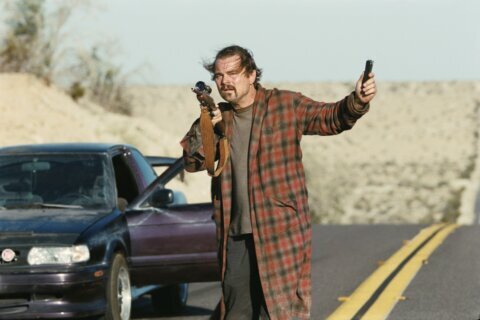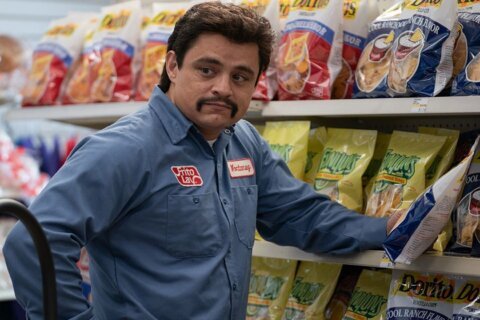Jason Fraley, WTOP film critic
WASHINGTON – Back in the early ’70s, when The Boss was still a debt-ridden employee caught in a legal battle with producer Mike Appell, Bruce Springsteen’s lyrics were overly dense and complicated. The struggling E Street artist sat on an unfinished “Born to Run” album with the notion, “More than rich, more than famous, more than happy, I wanted to be great.”
One day, a new producer came in with advice that changed his career and altered the course of music and movie history. He instructed Springsteen to write more cinematically.
“One phrase that we would use … was the ‘sound picture,’ what kind of picture was the sound of the record suggesting,” producer Jon Landau said.
Suddenly, Springsteen was painting vivid portraits in a sort of visual storytelling through song, like these from “Thunder Road.”
Screen door slams
Mary’s dress waves
Like a vision she dances across the porch as the radio plays
Drummer Max Weinberg noticed a difference. “Now you had this vast cinematic landscape,” he said.
If Landau had planted Springsteen’s cinematic seeds, they were fertilized by the arrival of Terrence Malick’s film about the Starkweather homicides, “Badlands” (1973). Starring Martin Sheen and Sissy Spacek, the film colored the leadoff tracks for two of Springsteen’s next three albums, first the title of 1978’s “Badlands,” and then the subject matter of 1982’s “Nebraska.” Springsteen reportedly saw Malick’s film on TV and recreated the image of Charles Starkweather meeting Caril Ann Fugate:
I saw her standin’ on her front lawn just a-twirlin’ her baton.
Me and her went for a ride, sir, and 10 innocent people died
Soon after, screenwriter Paul Schrader, who penned Scorsese’s “Taxi Driver” (1976) and “Raging Bull” (1980), asked The Boss to write the title song for his next film, “Born in the U.S.A.” The film ultimately changed titles to “Light of Day” (1987), with a title song also written by Springsteen for Joan Jett and Michael J. Fox. While “Born in the U.S.A.” became his most famous album, giving us Courteney Cox in a music video and a controversial campaign theme for Hollywood’s “Gipper,” American Songwriter magazine named “Light of Day” its Favorite Movie Song in 2011:
Been driving five hundred miles, got five hundred to go, yeah
I got rock and roll music on the radio
I got a brother on a rig just off the Gulf coast
He says the girls down there, well they’re really the most, man
As Springsteen entered the ’90s, he also entered his movie music prime. Crushed by the gay community’s criticism of his transvestite villain in “The Silence of the Lambs” (1991), director Jonathan Demme set out to tackle the taboo subject of AIDS in the movie “Philadelphia” (1993), starring Tom Hanks and Denzel Washington. To open the film, Demme took a page from Elton John’s “Amoreena” opening of “Dog Day Afternoon” (1975) and asked Springsteen to write an original song to layer his own opening montage. The result was “Streets of Philadelphia,” which won Springsteen an Oscar, a Grammy and ranked No. 68 on the AFI’s Top 100 Movie Songs.
The night has fallen, I’m lyin’ awake
I can feel myself fading away
So receive me brother with your faithless kiss
Or will we leave each other alone like this
On the streets of Philadelphia
Springsteen’s political statements shifted from gay rights to capital punishment with his title song for the movie “Dead Man Walking” (1995), about a nun empathizing with both a convicted killer on death row and his victim’s families. Susan Sarandon won the Academy Award for Best Actress, while actor Sean Penn, director Tim Robbins and Springsteen also got Oscar nominations. The Boss lost Best Original Song to “Colors of the Wind” from Disney’s “Pocahontas” (1995), with music by Alan Menken (“The Little Mermaid,” “Beauty and the Beast,” “Aladdin”) and lyrics by Stephen Schwartz (“The Hunchback of Notre Dame,” “Enchanted”). Springsteen’s lyrics were indeed much darker:
There’s a pale horse coming
And I’m gonna ride him
I’ll rise in the mornin’
My fate decided
I’m a dead man walkin’
The loss to “Pocahontas” was ironic, considering Springsteen’s favorite movie as a kid was John Ford’s “The Searchers” (1956), where John Wayne’s anti-hero struggles with racism toward Native Americans. Fittingly, that same year, Springsteen tipped his cap to Ford with his next album, “The Ghost of Tom Joad,” an obvious reference to Ford’s “The Grapes of Wrath” (1940), starring Henry Fonda in John Steinbeck’s tale of the Great Depression. Like “Working on a Dream” and “We Take Care of Our Own,” the populist lyrics paint working class Americans as modern day Tom Joads:
Now Tom said “Mom, wherever there’s a cop beatin’ a guy
Wherever a hungry newborn baby cries
Where there’s a fight ‘gainst the blood and hatred in the air
Look for me Mom I’ll be there
The Boss next proved his movie music range by collaborating on one of the best romances ever done, Cameron Crowe’s “Jerry Maguire” (1996). “Secret Garden” played as Tom Cruise and Renee Zellweger spoke lines like, “You complete me” and “You had me at hello.” The combo was so effective that radio stations played the movie quotes over the song, paving the way for Celine Dion’s song in “Titanic” (1997). The lyrics of “Secret Garden” tell of the vast secrets within a woman’s heart:
She’ll let you in her house
If you come knockin’ late at night
Shell let you in her mouth
If the words you say are right
If you pay the price
She’ll let you deep inside
But there’s a secret garden she hides
Springsteen continued down a similar path by making a cameo in “High Fidelity” (2000). Actor John Cusack originally wanted Bob Dylan for the cameo, but when he was unavailable, he called on Springsteen, who appears in a vision as Cusack lies in bed. As the vision disappears, Cusack says, “Thanks, boss,” followed by “Good luck, goodbye,” the last line of Springsteen’s “Bobby Jean.”
Most recently, Springsteen provided the title song for Darren Aronofsky’s “The Wrestler” (2008). Its lyrics tell of an aging pro wrestler (Mickey Rourke), but also speak to all down-and-outers trying to hang on amid a broken personal life. Springsteen reportedly offered to do the song for free, and it went on to win the Golden Globe for Best Original Song and earn yet another Grammy nomination:
These things that have comforted me, I drive away
This place that is my home I cannot stay
My only faith’s in the broken bones and bruises I display
Have you ever seen a one-legged man trying to dance his way free?
If you’ve ever seen a one-legged man then you’ve seen me
Now entering his fifth decade of music, Springsteen is still cranking out songs and marathon concerts, like the one Friday at Nationals Park. We movie fans can only hope he continues to lend his talents to the silver screen, as he’s one of the best at painting those visual pictures through his lyrics.
If you look at the country music charts today, you’ll see Eric Church’s tribute song “Springsteen” with the chorus, “Funny how a melody sounds like a memory, like a soundtrack to a July Saturday night.” You see, The Boss does not just make music. He makes soundtracks to the visual images of our lives, the motion pictures of our memories. Springsteen is a lesson that great audio transcends sound, creating a picture in our heads, a vision that dances across the porch as the radio plays.
Read more from WTOP Film Critic Jason Fraley by clicking “Fraley on Film” under the “Living” tab above, following @JasonFraleyWTOP on Twitter, and checking out his blog, The Film Spectrum.
(Copyright 2012 by WTOP. All Rights Reserved.)








